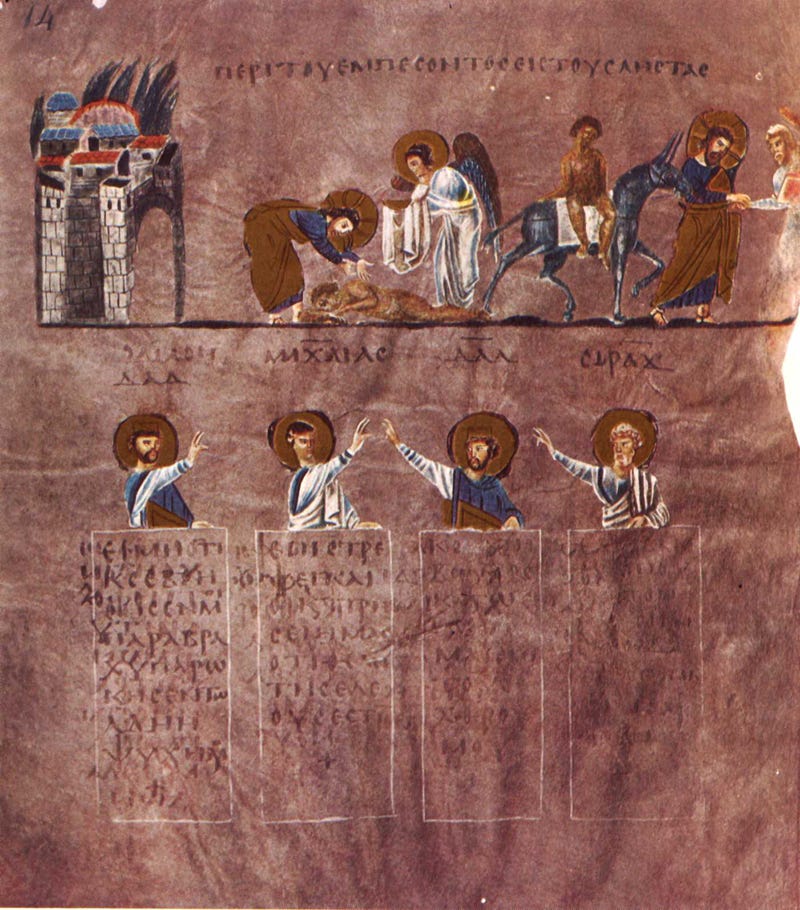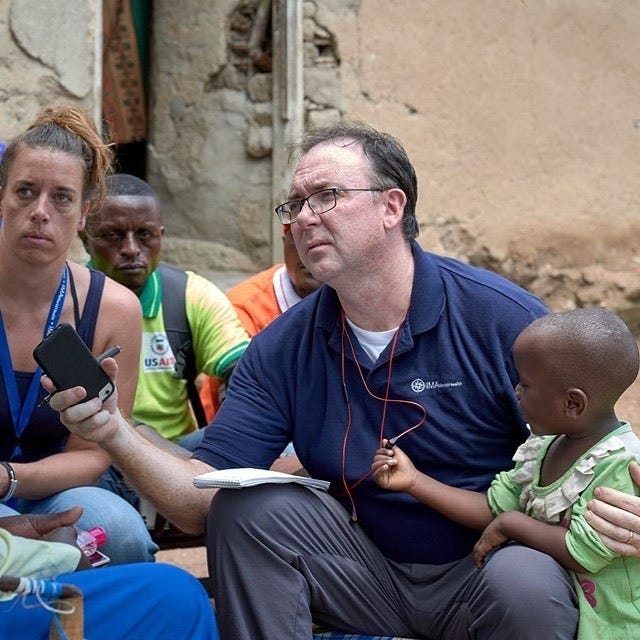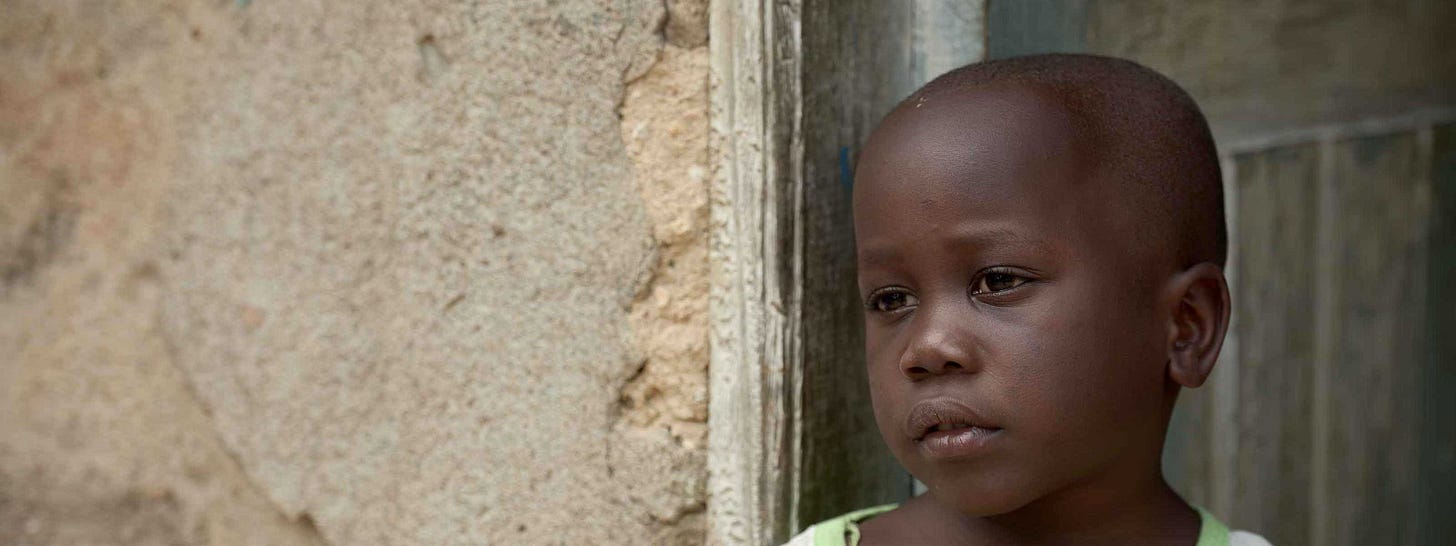Why helping isn't enough
The wounded man along the road to Jericho presents a gripping image of need in the Good Samaritan parable. But this is more than a feel-good story about helping people.
Scripture: Psalm 82; Luke 10: 25-37
Her name is Christivie, and when I met her in 2019 she was 5 years old. Christivie’s smile and sweet laugh made it next to impossible not to engage her. She played with the earbuds that hung around my neck while I sat with her aunt and uncle under the shade of a tree in the eastern reaches of the Democratic Republic of Congo.
Ebola had ravaged Christivie’s community. Even little villages like hers, far from densely populated cities, had endured deaths from the disease. Most people are killed within about 10 days of contracting it. But Christivie’s case of Ebola was different. When I met her she had become something so novel it took me a while to get used to saying it.
Christivie was an Ebola survivor. She was one of the few but growing number of people who got access to life-saving treatment within the very small window of time when she could survive the disease.
***

Survival is a daily goal for many in eastern Congo, just as it was for ancient Jews living under Roman occupation. Those of us born and raised in the church know this parable of the Good Samaritan as the quintessential lesson in offering assistance to others.
To be sure, I think that sense of responding to need is among the strongest in our wiring as human beings. Seeing wounds, bleeding, poverty, disease and other problems right in front of us compels us to act. We feel powerful when we feel like we are fixing hurt and misery.
I think any one of us would have helped Christavie if we had seen her in need. The wounded man along the road to Jericho presents a gripping image of need in Jesus’ parable. But this is more than a feel-good story about helping people.
In Jesus’ day the Jericho road was dangerous. Historians point out that even up until the 18th century travelers on this rocky path in the mountains often paid guards to escort them, for fear of being attacked. But the risk of traveling the road was necessary, especially to the Jews in Jesus’ era. This was how Jews in Jerusalem and Jews in Samaria remained connected at a time when the movements of Jews were tightly controlled. Jews had to make a conscious choice to engage other Jews, and their primary point of connection was to travel on a dangerous road.
Jesus was known as a teacher of Jewish law. Helping people in need was already a fundamental teaching in ancient Judaism. This crew challenging Jesus already knew the law told them to help people. And so when Jesus is with the Pharisees and the lawyer asks, “who is my neighbor?” the point Jesus makes is to emphasize that our own well being is wrapped up with the well being of others not just in front of us, but everywhere. Whether we are there and see needs face to face, or not, we are called to care: “...he departed, he took out two pence, and gave them to the host, and said unto him, Take care of him; and whatsoever thou spendest more, when I come again, I will repay thee,” verse 35 points out.
If the standard Jesus validates is to care for those in danger, even if we are not enduring it ourselves, then our work must be more radical than helping. We are called to care for all others, those right in front of us, or not. All others, Jew, Samaritan, white, black, American, immigrant, asylum seeker, gang member, deportee, prisoner - everyone. Jesus speaks to his audience and to you and to me even today, reminding us that following Him means seeing each human being as a child of God who is worthy of safety and care regardless of how we might qualify them. Jesus expands the concept of neighbor from being about the happenstance of proximity into a moral obligation each of us is required to meet. Our neighbors are all other human beings, and the lessons of Ebola remind us how loving our neighbors as ourselves helps ourselves in the process.
***

When a patient contracts Ebola and is admitted to a health facility, the first step responders take is to get a detailed history of that person’s whereabouts for the preceding 21 days. Health workers then visit the areas on each patient’s list, seeking out other suspected cases of Ebola. I spent some time with these brave individuals who volunteer to go door-to-door in the hot zone, walking paths of red clay and volcanic rock searching for cases. It’s almost always faith-based organizations that perform this work because they can reach so deeply into communities others often ignore. Should these volunteers encounter someone with Ebola symptoms, they call an ambulance. Information is shared with nearby homes and the whole community is monitored for symptoms.
For any family in the outbreak zone the very health of the community is wrapped up in the well being of their neighbors. It’s precisely the point Jesus was trying to make in the Samaritan tale. That our spiritual - and, often, even our physical - survival, our righteousness - is tied up in the well being of our neighbors whether we see them, or not.
Working with and for our neighbors is not always easy. After all, many Samaritans and Jews were taught to hate one another. Following years of colonialism and its lasting effects of poverty, there are many in the outbreak zone in Eastern Congo who resent foreign help. Some even claim that Ebola doesn’t exist- that it’s a western hoax to gain control. White trucks and aircraft fueled by millions of dollars in investment in fighting Ebola brings resentment from people whose need for food and clean water and peace often go ignored. They resent the investment of resources being made to keep Ebola in their communities while other, chronic needs have been unanswered for years.
And so, many people of eastern Congo rightfully hold the international community in suspicion right at the time our mutual well-being - even our very survival - depends on our cooperation to contain a deadly disease. Until recently, we invested much in containing Ebola and keeping it in places like the Congo, preventing its spread. But we have much more work to do in making it possible for people in Congo and so many other places to enjoy rich, abundant lives like you and I have. Like that road to Jerhico, the road they walk is not safe.
That reality began to sink in on me as Christivie wiggled into my lap.
We had saved Christivie’s life, but she will live in a country where 1 in 3 women endure some sort of assault or abuse.
We helped her little body to beat Ebola but we have not found a way to ensure she will have access to enough food in this world of plenty so she can develop and grow.
We used the latest in pharmaceutical research to give her immune system the strength to overcome one of the most aggressive diseases on the planet. But we still cannot figure out how to use science, technology and all the other tools God has given humanity to reach past the forces of greed and power so everyone - everyone! …in God’s world has the opportunity to enjoy the rich, abundant lives God wants for all of God’s people.
Yet the real tragedy is darker. Christivie will likely face the fate of so many orphans in the Congo. By now, it is most likely she has been sold by her uncle to a wealthier family to live her life as an indentured servant.
This is why we cannot focus on the feel-good aspect of helping people alone. Christivie reminds us that it is not enough to give the Samaritan help. Yes, it feels good to help a child. Humankind spent millions getting her treatment to survive only for Christivie to live a life of forced service and misery.
We can keep helping people in need but, at some point, we have to ask ourselves why we’re not eliminating their suffering to begin with. We must ask ourselves why the wounded Jew on the Jericho road endured beating and a robbery in the first place. You and I have been given abundance and comfort and privilege and status Jesus calls us to use to help our neighbor. But our help is only as good as our drive for change.
To ask why we abide public budgets that invest more in prisons than in education;
To ask why we allow 1 in 5 children here, in the world’s wealthiest nation, to go to bed hungry every night;
To ask why we are not using every power available to us - public and private resources - to eliminate preventable diseases and needless suffering;
To ask why the interests of a nation should supersede a common humanity where all are fed, welcomed, cared for and loved;
Ebola doesn’t know a nationality. Our great illness is that we are addicted to feel-good acts of help that make us feel like we’re solving problems while we buy into the lies we’re told about people in need that keep them in danger. Being a Good Samaritan means more than offering immediate help. Jesus asks us how we are making the world safer? How are we extending God’s table and abundance of welcome so that ALL might enjoy God’s love and grace? As Dietrich Bonhoeffer said as he endured the rise of Hitler and the Nazi regime, “We are not to simply bandage the wounds of victims beneath the wheels of injustice, we are to drive a spoke into the wheel itself.”
The world needs Good Samaritans. But our actions cannot be limited to token help that gives us warm fuzzies. Following Jesus means transcending nationality and politics and race and creed to end human suffering regardless of the hate we inherit. That a Jew helped a Samaritan in Jesus’ story expresses the shared sense of humanity that connects us beyond what we’re told to fear and hate about one another. And in this moment when so many are so divided, we must take the risk to walk the dangerous road of conversations at work and school and in the voting booth and on opinion pages and in social media and all the other ways we use our voices.
Being a voice for the kind of change Jesus expects us to make will take just as much courage as staring down a deadly virus. But that’s the job. And as we see the results of a world hell-bent on selfish choices and feel-good acts of charity that amount to a Band-Aid on a sucking chest wound, I wonder just how much longer we’re willing to live with the incessant drip of misery.
We can turn off the tap of misery. A kinder, more welcoming world waits for us if we work to see every human being as a reflection of God and hold one another accountable for all the ways we fall short of it. It’s not an easy job. But our work begins with the easiest of questions, asked to Jesus by a chastising lawyer who benefitted from the power and privilege he enjoyed in keeping the status quo. “But he, willing to justify himself, said unto Jesus, And who is my neighbour?”.
###



